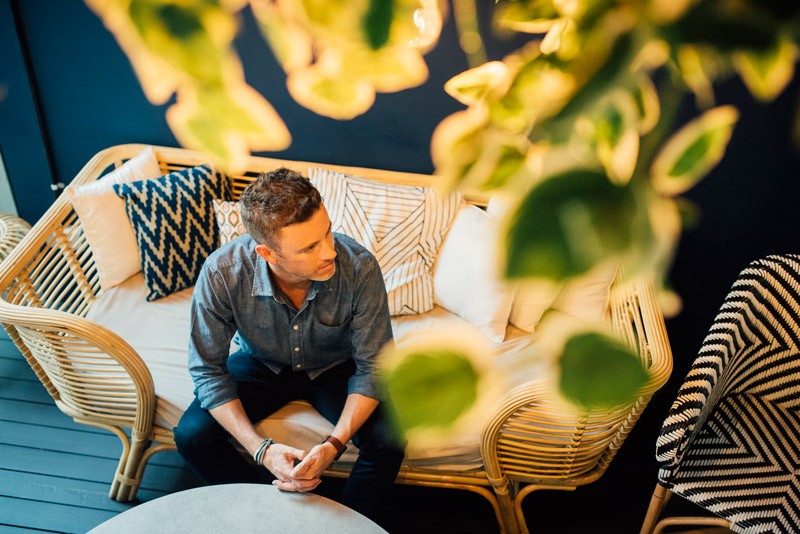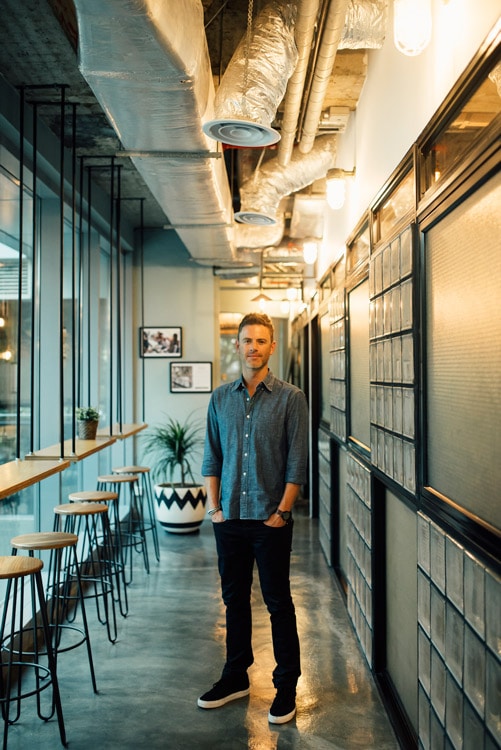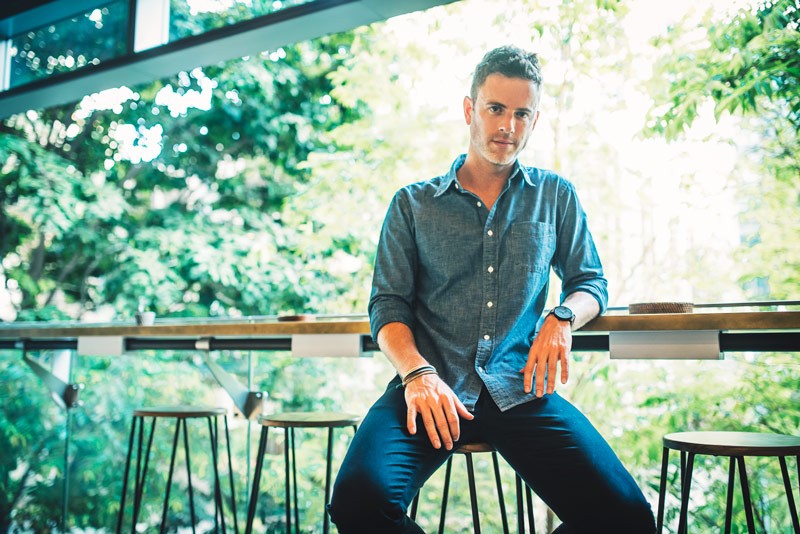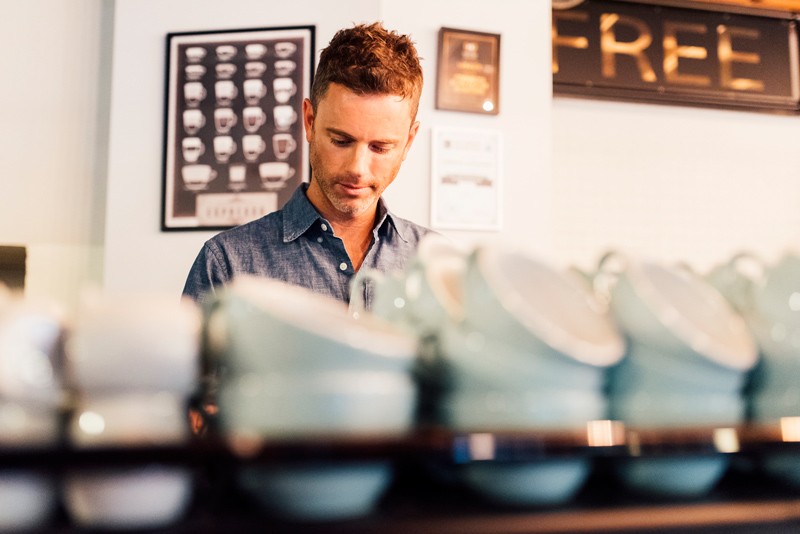Harry Grover: Finding Middle Ground
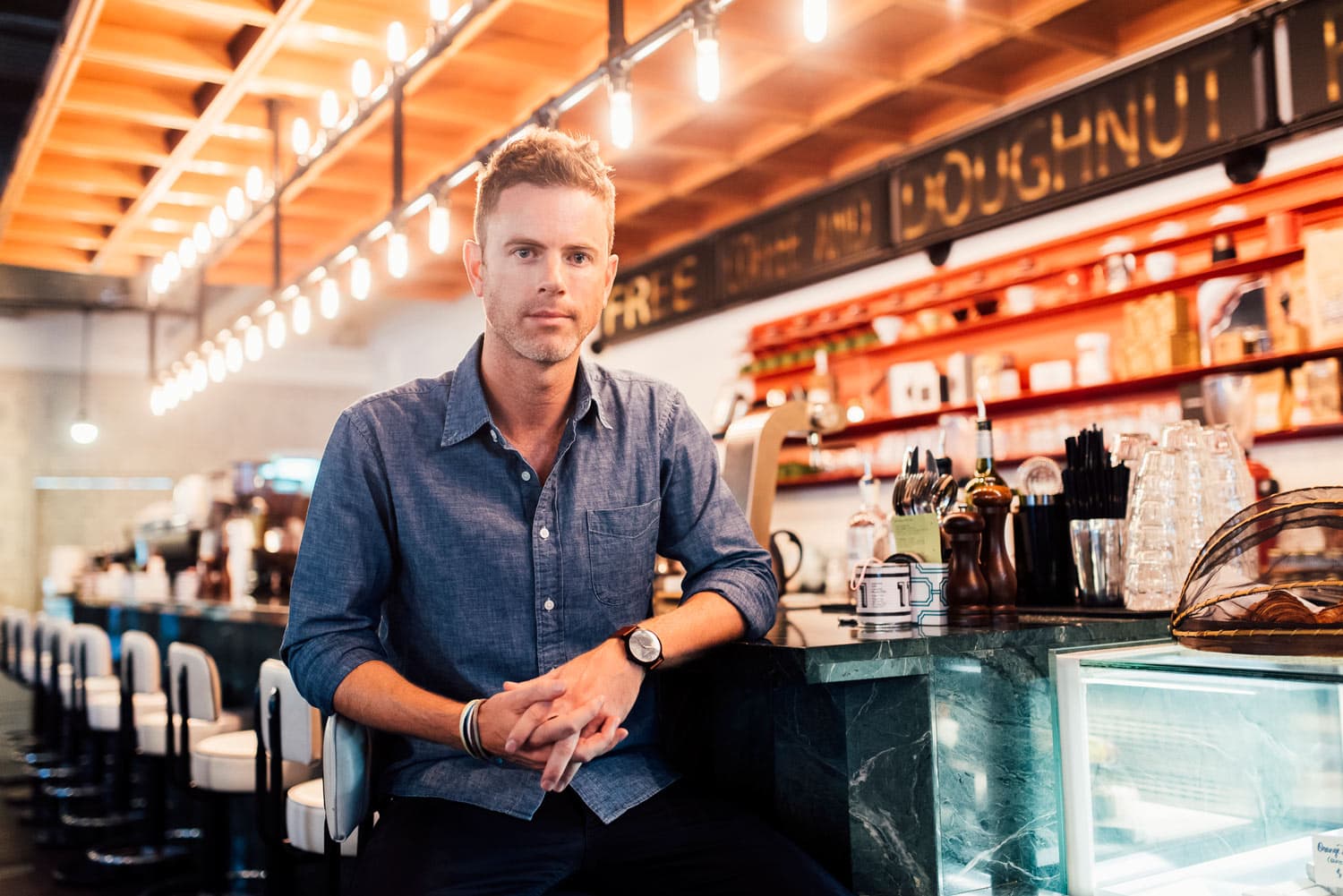
It’s slightly difficult hearing Harry Grover from across the table. We’re both seated in the balcony of Grounded by Yoga Movement, a joint cafe-cum-yoga studio upstairs of his coffee shop, Common Man Coffee Roasters, and the cool, dim space is filled with the sounds of thumping deep house and passing traffic. I focus hard, leaning in to listen as the Perth native, with characteristic, almost stoical candour of speech, tells me about just how “unsexy” he is. As the founder of popular specialty coffee joints, 40 Hands and Common Man Coffee Roasters, Harry counts among early stalwarts who introduced and established Third Wave coffee in Singapore, which made the humble coffee shop a place to see and be seen. He's even had a hand in establishing similarly chic and hip F&B outlets, Open Door Policy and Tiong Bahru Bakery. Harry refers to the multiple successes under his wing as "sexy establishments", yet persistently uses the term "unsexy" to describe his business skills and work. He places such strong emphasis on the fact that it takes more than just glamour and being cool to succeed in the F&B business, that I am convinced there's more than meets the eye. “Lucky” is another word that pops up frequently in our conversation, and Harry is quick to attribute his success thus far to luck, timing, and those around him—from his family to partners at Spa Esprit Group and Five Senses Australia. This show of self-deprecation and humility gives me slight cause for pause, especially since it is delivered with what he knowingly calls his “resting bitchy face”, an unsmiling, slightly severe persona that is a far cry from the cheeky, toothy smiler I know from research. What I don’t expect is how assiduously thoughtful and earnest Harry is. So far, he has offered me a drink, turned down the music and changed our seats to ensure a conducive environment for the interview. He’s even jotted down pages of notes in anticipation of my questions, startling me slightly with the intensity of his preparation. Right now, Harry is in the midst of seeking growth and development, both on a personal and business front. He is cautious and reflective even in the face of greater international success, as he prepares to launch the first two branches of Common Man Coffee Roasters, overseas. Harry frankly admits, “I’ve been so focused on the business and its operations for such a long time that I’ve become a bit of a curmudgeon. To get better at what I do and to reach that next level in the business, I need personal growth.” This self-described “natural compromiser” offers refreshing objectivity and balance in perspective of his capabilities and limitations, which is admirable for someone who confesses to being motivated by middle-child syndrome, and a bit of a “chip on the shoulder”.
TEO REN FENG: You run two coffee shops and a coffee roastery. Are you really just not a tea person?
HARRY GROVER: I actually love tea! The first thing I do every morning is to make a cup of English Breakfast or Earl Grey. I’m too lazy to do a proper coffee like a pour over… and I can just dunk in a teabag.
REN FENG: I take that you’re not a tea connoisseur then.
HARRY: No. I’m not even a coffee connoisseur. I love coffee and the business of it, but I’m by no means a purist.
Luck plays a huge factor in a successful business—and timing as well.
REN FENG: You make and sell specialty coffee. Has your passion or interest in the subject changed since you first started with Forty Hands in 2009?
HARRY: Well, your story is very clear and simple when you start out. It’s just you plus one or two staff, right? You think: I want to run a really good coffee shop that promotes specialty coffee, educate and advocate. Then you work on another store, plus side projects with your F&B partners, and you get really busy. It’s ironic, but as the business grows, you get more removed from the core product since you need others to take care of that aspect for you. At the moment, what is important to me is running a successful business—it could be selling shoes and I would feel the same, but it just so happens to be coffee. I am obviously still very interested in it, but I’m also interested in many other things. So, what’s changed? You get more removed from the product—which is a shame—but it’s also really satisfying to see your people grow and get more skilled and talented at what they do.
REN FENG: How important is that for you?
HARRY: For me, a successful business is one that has a good working environment and a positive culture. I started out with guys who had a little F&B experience, mostly waiting tables. Now they’re head baristas, head trainers, head roasters with Q Graders certificates, which is a really high level of coffee grading. The expertise that you can foster is amazing and satisfying. It’s really motivating and all this is more motivating than the. . .
REN FENG: The money?
HARRY: No, the coffee! [laughs] The product.
REN FENG: So it’s less about the coffee, but more about running a business.
HARRY: Yeah. I’ve been reading this book, How to Fail at Almost Everything and Still Win Big, and it talks about how it is to run a successful business organisation. It really, really speaks to me, especially on the idea of successful people saying: “Oh, I got here by having 100% passion for my product.” That’s bullshit. It’s a humble, sexy way of saying: “Actually, I was super organised, I had excellent working systems, and I had a lot of luck.” Luck plays a huge factor in a successful business—and timing as well. People don’t acknowledge that. I’ve had shit-loads of luck—huge amounts—and the timing has been right for me. You ride that luck with a little hard work, and if you happen to fall into something that works for you and have some initial success, then you can grow. I’ve tried businesses that failed.
REN FENG: Broadcast HQ?
HARRY: Yeah, Broadcast HQ. That was a huge lesson and it was opened at a time when I had a fair amount of hubris. I’d done Forty Hands and helped my partners start Open Door Policy and Tiong Bahru Bakery, which were all runaway successes. So you think: Ah, I’m untouchable. Everything I touch turns to gold, right? And then you do something like Broadcast HQ, and you realise that it isn’t just you or your talent. A large part of what you’ve accomplished is because—yes, you had some skills that helped, but you had a lot of luck too. People think you must have a passion for the product in order to succeed—if it were as simple as taking your interest and turning it into a sustainable business, then why haven’t all the bakeries and cafes that opened in Singapore in the last five years survived? You need to be fully aware of what it takes to start and maintain a business.
When you’re in start-up mode, you pretty much just do whatever it takes—no such thing as weekends or Friday night parties.
REN FENG: What else does it take to run a profitable F&B business in Singapore?
HARRY: Before working on Forty Hands, I was involved in the family business back in Perth and that experience helped greatly, because I had to deal with manpower issues—something every F&B entrepreneur faces here. Running a commercial cleaning company from 2003 to 2009 was a highly stressful period because the Perth mining boom had sucked up all the talent and manpower. As a human resource business, we were scraping the bottom of the barrel for workers and there were constant levels of staff crises. Many times, my brother and I would put on the uniforms and go out to clean at like 2 to 3 a.m. in the morning, just to get the job done. That experience made me resilient and taught me to be a problem solver. You become very savvy and also learn how to do a bit of everything yourself, because when shit hits the fan, you’re going to have to be the one to do it. Honestly, it can be very tiring. I think a lot of F&B owners here don’t survive because they lose stamina and burn out. For example, it can be smooth-sailing for the first month and the next, you lose 2 chefs or someone falls sick, and you’re back to square one. You have to work smart, so that you’re not physically killing yourself. However, when you’re in start-up mode, you pretty much just do whatever it takes—no such thing as weekends or Friday night parties.
REN FENG: It sounds exhausting. Why choose F&B then?
HARRY: It’s because I saw a business opportunity and wanted to make money from it. There’s this great saying, “Work out the price of success, and then pay it.” I believe money buys time and freedom and I want to be in a financial position that gives me that. I guess that equals to not working in a place where you become part of the bureaucracy. I’d shoot myself in the head if someone told me: “You can’t go away for Christmas because you don't have enough leave.” I can’t live like that. I’d rather go away and deal with the stress of my phone ringing and problems at work, than not have that option. And I like that for the effort that I put in, you get very tangible results, which is very satisfying. If you’re working in a consultancy for example, it can be hard to see if what you’re doing truly makes a difference.
REN FENG: How much of the price of success do you think you’ve worked off?
HARRY: I’ve been here for 7 years and at 36, I’m still not married and I don’t have children. I’ve put everything into this business and it has cost me relationships and being away from my family and support system. It’s not a great, grand adventure in Asia like people think. It’s a sacrifice.
REN FENG: We’ve been fairly warned then.
HARRY: It’s not all doom and gloom. [laughs] Being an entrepreneur is a natural fit for me. I worked as a teacher and had other occupations before, and I realised that I don’t like bureaucracy or listening to authority. My father’s exactly the same, so by nature or nurture, I had quite a strong mantra from early on and that was: The fewer bosses I have—the fewer masters—the better I feel and perform. I learnt so much from my father that I became very similar and wanted to make my own mark. I’m a typical middle child; we’ve a bit of a chip on our shoulder.
REN FENG: You believe in the middle-child syndrome?
HARRY: Totally. We like to think no one’s going to assume that we’re going to rise to any greatness. So I quietly went: I’ll show you what I can do. I’m not going to stay working in your cleaning company. [laughs] I was also pretty starved of creativity, working in a cleaning company.
REN FENG: You’ve had creative collaborations with partners like Archipelago Brewery and Yoga Movement. Do you actively look for such opportunities?
HARRY: Yes, definitely. Working in this business allows you to meet many people and get inspired by others doing cool stuff. Whether it’s Grounded with Yoga Movement or Neh Neh Pop with Bjorn Shen, you do it because it is fun and different, and to keep your staff interested so it’s not just the humdrum every day. I’ve learnt a lot from my business partner, Cynthia [Chua] of Spa Esprit group, and I constantly try to innovate, though my business strength is really in helping to execute.
You just need to be able to replicate what’s good.
REN FENG: How so?
HARRY: I’m a classic thinker, which means I’m detail-oriented, organised, timely, fairly cautious and risk-adverse. You’d think it isn’t a natural entrepreneurial type, but if you work with others, you can create a really strong business. Some of my partners are typical feelers—they’re relational, group-oriented and very enthusiastic. They go, “Yeah! Let’s do this and do that.” And as a thinker, I say, ‘Well, hang on, let’s step back for a second,’ and proceed to list all the risks and problems. If you get a “creamy middle” between the two types, you produce really good work. My reliability and consistency—traits not traditionally termed as sexy—are perfect for the café industry. People undervalue these, but keeping my shop clean, my food and coffee tasting great, my music just right and my staff smiling are what truly satisfies me. You don’t need to reinvent the wheel and do seasonal menus every three months. You just need to be able to replicate what’s good.
REN FENG: You’re opening a Common Man Coffee Roasters (CMCR) in KL. When can we expect it and will it be different as compared to the one in Singapore?
HARRY: It’s going to be ready around November 2016. In terms of operations, it’s not very different, but as our first overseas set-up, we’re learning that what works here might not elsewhere. You can’t just cut and paste. Like many of my experiences, you dive in and deal with the unknowns, invisible hurdles and pitfalls along the way. It’s a stressful learning curve but also a breath of fresh air.
REN FENG: You made unusual location choices with both Forty Hands and CMCR Singapore that turned out to be hits. Can we expect the same for KL?
HARRY: The CMCR KL neighbourhood, which is called TTDI (Taman Tun Dr Ismail), is pretty nice and upcoming, though the reason why we chose the site was really simply because it offered us the most space, at an attractive rate. With Forty Hands and CMCR Singapore, I will occasionally blow my own trumpet and say: Oh, it was all me and my brilliance choosing the location, but a lot of it was just luck. Using Broadcast HQ as an example, we were dead sure that a Brooklyn-Melbourne style indie dance nightclub with a restaurant serving barbeque food was going to work in Little India. I still love the concept but did it make sense in that location? No.
REN FENG: What was your biggest take away from that failure?
HARRY: As a business, if you don’t keep your message simple, you fail. What are you really known for? People go to Forty Hands and CMCR for the coffee, food and vibe, as the message is clear—we know our coffee, we’re coffee-specialists and advocates. With Broadcast HQ, the message wasn’t clear. Is it a restaurant or a club? What’s the target market? We underestimated what was required to open in that location and the same thing goes for Kiasu Expresso, a coffee bar that I opened in Tanjong Pagar.
REN FENG: You didn’t close that one to focus on CMCR Singapore?
HARRY: That’s the official story. It was a failure. I thought: Tanjong Pagar has wonderful weekday traffic, a huge office crowd pouring through it, so I’ll be able to kill it there. I didn’t think: How many coffees am I going to have to sell to pay the rent in a mall? I didn’t have a tight concept or do enough research. You can’t sell espresso-based specialty coffee in a mall that doesn’t have the right demographic, with not enough seats.
REN FENG: It’s refreshing hearing all this because you’re painted as this golden boy with the Midas touch.
HARRY: I am! [laughs] It’s what you want people to think, but I acknowledge that I’m weak in some areas. It isn’t because I’m so great and smart, or that I’m so resilient and strong. I’m lucky to have found people who give me the autonomy and finances to focus on what I can value-add to their business. I also have the privilege of working with a big company where I get human resource and back-end support.
I don’t think there’s any right kind of personality to run a business.
REN FENG: You’ve done well enough to be expanding overseas to KL and another city. What is CMCR’s greatest challenge as a business, at this point?
HARRY: Our current challenge is our mission and vision, and setting the culture of our business. We’re in that golden age where you’ve done the hard yards for 3 years, established credibility, and can now hopefully enjoy some growth. As we get bigger, there are multi-departments and you don’t always know what each other are doing, like ships in the night. There can be a lot of miscommunication and while you can start an internal conversation, that can make you forget about the customer because you’re simply working between departments.
REN FENG: At which point did you start feeling the need to set this direction?
HARRY: When we started our wholesale business. It was a complete different kettle of fish from the cafes, especially since it is a B2B not B2C, and we had new positions like Trainer, Roaster, Account Manager, Quality Control, all these specialised technicians. We didn’t want them to be operating in their own universe. We want the same behaviour and professional manners to dictate how we all work, but apply different rules to different jobs. It’s only been in the last 18 months that we’ve really started to get on the right track. Whether you are packing boxes or frying an egg, we want to make sure you’re working in a positive way, and you’re respectful and supportive of colleagues and the company.
REN FENG: How has your leadership style evolved?
HARRY: As a small-business entrepreneur, the biggest challenge is to let go. I can be a control freak and the business is currently growing way beyond what I personally want. I know I add more value at this stage if I can have a macro perspective, and for that I need personal development. I’m trying to stop and smell the roses, be more positive about changes and I’m learning to entrust my really great, talented staff with more responsibilities. I plan to stop working weekends too.
REN FENG: You still work during the weekends?
HARRY: Yeah, I still work the coffee bar. [laughs] It’s my idiosyncrasy. I know I need to let go a bit, and let people perform in their roles. I always threaten: F*ck this, I’m just going to go lie on a beach! It’s probably a thought most entrepreneurs have at least once a week, but I’m not about to stop and become a tai tai.
REN FENG: What’s struck me most is how honest and ready you are to admit to needing to change, improve and compromise. It’s not what you imagine of a typical entrepreneur, forging ahead.
HARRY: I don’t think there’s any right kind of personality to run a business. Certain people are really stubborn and principled, and people respect them for that, particularly if they’re successful. People think, “He stuck to his guns and didn’t care what others said. He pushed through.” It’s a great, sexy story. You don’t want to hear, “Oh this guy, he compromised here and there; he chopped and changed all over the place.” But for me, when there’s no compromise, I think you’re setting yourself up for failure. I see businessmen who go, “No! The customer’s an idiot, he doesn’t understand.” Actually, the customer is your greatest litmus test. You put your work at their feet, isn’t that right? [laughs] Give people what they want. Have a key set of values about your product, but don’t be such a purist to the sacrifice of your business or livelihood. It just boils down to what success means to you.
****
Edited by Wy-Lene Yap
